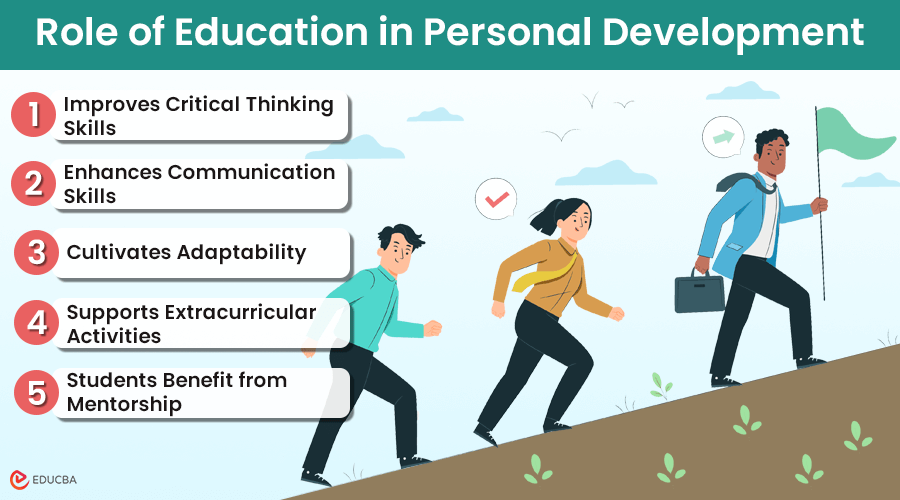Role of Education in Personal Development – Overview
Education isn’t just about getting good grades; it impacts many areas of life. For example, studies have shown that students who focus on critical thinking skills handle life’s challenges better. Education helps shape who we are and boosts important skills like adaptability and resilience. In this article, we will look at the role of education in personal development and how it prepares individuals for a successful life.
How Education Shapes Personal Development?
#1. Improves Critical Thinking Skills
Critical thinking is vital for personal growth. It helps us face challenges with confidence and make better choices. Key components of critical thinking are:
- Analyzing information
- Questioning assumptions
- Logical reasoning
- Problem-solving
Education builds these skills by encouraging students to explore information, question beliefs, and consider different viewpoints.
A study by the University of Michigan showed that critical thinking exercises improve students’ grades and problem-solving abilities.
#2. Enhances Communication Skills
Education improves students’ communication skills through discussions, presentations, and group projects. These activities teach them to express ideas clearly, listen actively, and adapt their communication to different contexts.
Education develops four communication skills:
- Verbal
- Written
- Active listening
- Nonverbal
#3. Cultivates Adaptability
The role of education in personal development is crucial for helping students adapt. It encourages them to face new challenges, learn from failures, and expand their knowledge. A growth mindset enables students to see obstacles as learning opportunities.
Strategies for developing adaptability:
- Embracing Change
Welcoming new experiences and perspectives is key. Stepping out of comfort zones fosters growth. For example, joining clubs and attending community events exposes students to diverse cultures and ideas, making them more flexible and open-minded.
- Learning from Failures
Viewing mistakes as learning opportunities is crucial. Research from the University of Massachusetts shows that seeing failures as steps to success builds resilience. By analyzing what went wrong, students can learn valuable lessons and turn setbacks into chances for improvement.
- Continuous Learning
Staying curious and committed to lifelong learning helps students stay relevant in a changing world. This can include formal education, online courses, workshops, or self-study. Pursuing new knowledge and experiences enhances flexibility and personal growth.
The U.S. Department of Education underlines the necessity for continuous skill advancement. This is significant in ever-evolving job markets. Furthermore, searching for new knowledge and experiences embellishes flexibility and prosperity.
Students face academic pressures that test their adaptability and communication skills. During such times, some students may consider the practicality of solutions like opting to write my paper for cheap to manage overwhelming assignments. It shows their strategic decision-making. They weigh the benefits of seeking help against their other duties.
#4. Supports Extracurricular Activities
Extracurricular activities are vital for personal development. They let students explore their interests, develop skills, and build relationships. From sports teams to student groups, these activities build teamwork, leadership, and time management skills. These activities also boost students’ grades and build vital life skills for the future.
#5. Students Benefit from Mentorship
Mentorship gives students guidance, support, and inspiration from experienced people like teachers, coaches, and community leaders. Effective mentors have certain qualities, including expertise, empathy, guidance, and inspiration. These traits allow mentors to build a supportive and encouraging relationship with students, helping them reach their full potential.
A study by the University of Massachusetts shows that mentoring helps students in several ways:
- Boosts confidence
- Improves grades
- Career preparation
Lifelong Benefits of Personal Development
1. Builds Essential Skills for Personal Success
The role of education in personal development is crucial for developing essential skills and qualities that drive success and well-being. Through education, students learn:
- Critical thinking
- Communication
- Adaptability
2. Positive Impact on Society
Personal development benefits society by helping students become:
- Engaged citizens
- Community leaders
- Agents of positive change
3. It’s a Journey of Self-Discovery
Education is more than just reaching a goal; it is a journey that helps us learn about ourselves and grow as individuals. As students take this path, they gain:
- Knowledge
- Resilience
- Empathy
4. Develops a Growth Mindset
The role of education in personal development includes fostering a growth mindset. This mindset, popularized by psychologist Carol Dweck, involves believing that effort can enhance abilities (Source). Those with a growth mindset are more likely to:
- Face challenges head-on
- See obstacles as opportunities
- Achieve their goals through perseverance
5. Prepares for the Future
Personal development helps us succeed, find happiness, and create positive changes. By focusing on personal growth, individuals can:
- Realize their true potential
- Handle future challenges
- Seize new opportunities
Final Thoughts
Remember, education is not just a phase of life but an ongoing journey of personal development. Hence, always seek new skills and experiences to keep growing and evolving.
Recommended Articles
We hope this article on ‘Role of Education in Personal Development’ was insightful. For more such personal development-related blogs, refer to the posts below.

